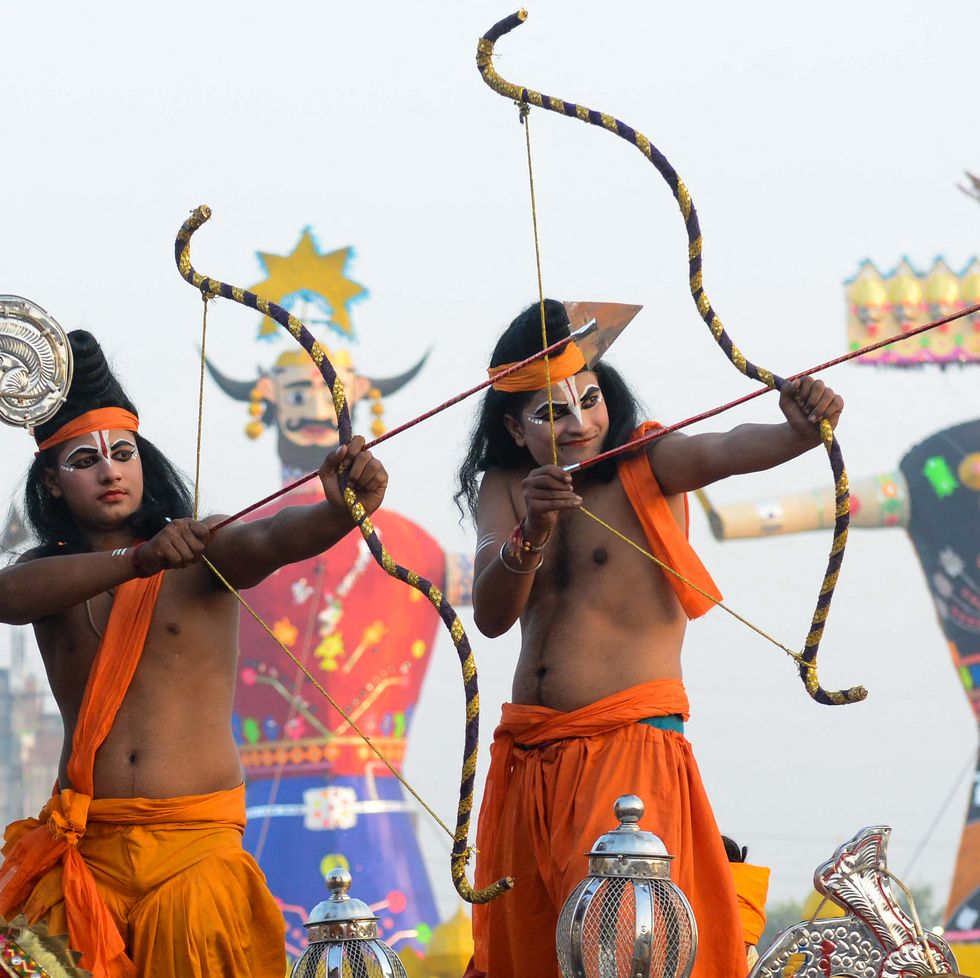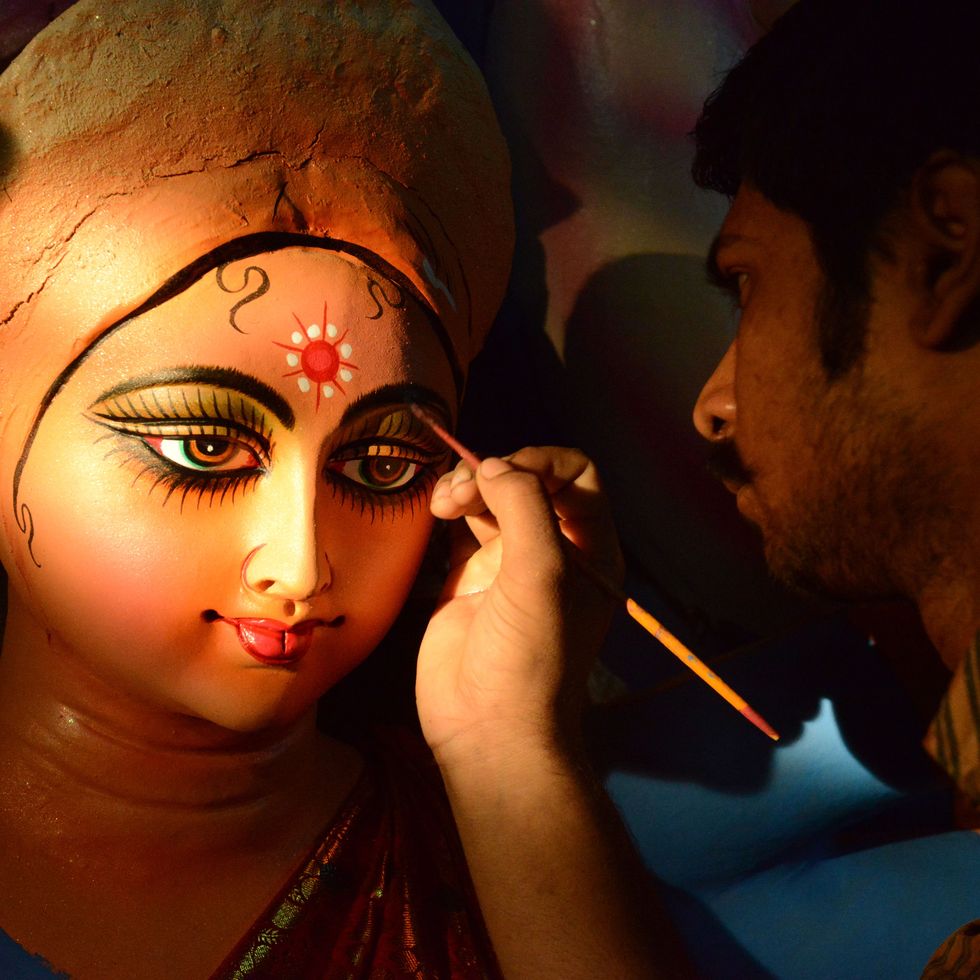| Brijana Prooker |
You may be familiar with Diwali, the Hindu “Festival of Lights.” But Dussehra, a Hindu holiday signifying good’s triumph over evil, is just as vitally important.
Dussehra commemorates Hindu deity Lord Rama’s defeat over the 10-headed demon king Ravana. It’s a time to cheer on good’s defeat over darkness with family and friends, and to reflect on negative qualities (prejudices, toxic relationships, vices) you’d like to vanquish in the new year.
Dussehra rituals vary across India (and therefore the U.S.) but often include song, dance and vibrant, colorful processions. Manisha Mittal, board certified rheumatologist and founder of Moksha Holistic Center for Integrative Medicine, describes Dussehra as an occasion for “families to come together and pray and share love, kindness and sweets with friends and neighbors.”
Desserts like kheer (rice pudding), jalebi (a fried, spiral-shaped dessert similar to funnel cake) and ladoos (dessert balls reminiscent of donut holes, often flavored with cardamom, raisins and almonds) are staples in Mittal’s Dussehra festivities. Baking with family, while meditating on the good in life worth celebrating, makes Dussehra special for many Indian Americans.
How is Dussehra celebrated?
On the streets of India, Dussehra is celebrated by burning fireworks-filled effigies of demon Ravana, symbolizing light’s prevail over darkness. It’s the grand finale event after nine days of open-air theatrical reenactments (known as Ramlila) which depict Lord Rama’s battle with demon king Ravana.
In the U.S., Dussehra celebrations are typically quieter, though equally festive. Hindu Americans dress up in traditional Indian attire (like saris and kurtas) and host Dussehra festivals. “These events bring the community together for lively music and dance,” says Pallavi Jain, an HR professional who grew up in India but has celebrated Dussehra in the U.S. for over a decade.
Either in temples or at home over a celebratory family dinner, Hindus reflect on vices to rid themselves of in the new year. But there’s no singular way to celebrate. Rather than focusing on negative qualities still to conquer, Avani Modi Sarkar, co-founder of 2021 Good Housekeeping Best Toy Award winner Modi Toys, which makes plush Hindu deities, plans on celebrating Dussehra this year by having her three young children write down or draw a picture of fears they conquered (potty training, bike riding and bugs) to throw into a Dussehra bonfire. “There is something empowering about seeing your fears go up in flames,” she says.
What is the significance of 9 days of Dussehra?
The nine days of festivities leading up to Dussehra take place during the Navaratri festival, which in many parts of India, focuses exclusively on Hindu Goddess Durga’s nine-day epic battle with buffalo demon Mahishasura. Like Rama’s defeat of demon king Ravana, Goddess Durga’s conquest of demon Mahishasura — on the tenth day of battle — represents the prevail of good over evil. It is said that Goddess Durga blessed Rama before his battle with Ravana, leading to his victory.
The nine-day celebration preceding Dussehra is devoted to Ramlila, the dance and dramatic reenactments of Lord Rama’s battle with 10-headed demon king Ravana. The festivities culminate with a fireworks-fueled celebration on the tenth day, Dussehra.
What is the difference between Diwali and Dussehra?
Diwali, the festival of lights, is held 20 days after Dussehra and is celebrated with dance, prayer and feasts. This year, Diwali falls on November 12th. Like Dussehra, Diwali celebrates the power of light over darkness. Diwali is celebrated differently depending on religion and region, but the overriding theme — that goodness defeats evil — remains the same.
For Hindus who celebrate Dussehra as the day Lord Rama killed demon king Ravana, Diwali marks the night Rama returned from battle to his kingdom of Ayodhya, the glow of thousands of lamps welcoming him and his wife, Sita, home.
When is Dussehra?
The holiday is always celebrated during Ashvin, the seventh month in the Hindu calendar. It usually aligns with the months of September and October.
- October 24th in 2023
- October 12th in 2024
- October 2 in 2025
Dussehra wishes
A quick Google search of “Dussehra” reveals long lists of Dussehra wishes, such as “May Lord Rama grant you light this Dussehra” and “May your troubles burn with Ravana’s effigy.” These curated quotes — perhaps an oversimplified, Westernized version of Dussehra — give the false impression that giving and receiving wishes is the focal point of Dussehra. The core of Dussehra is less about wishes; more about faith. Faith that light will always remove darkness.
Whether or not you choose to partake in Dussehra wishes will depend on your region and personal preference, but sending someone good wishes on a holiday that celebrates goodness is never a bad idea.

Brijana Prooker is a Los Angeles-based freelance journalist and mom to two peanut butter-colored rescue girls (a pit bull named Ivy and kitty named Doosis). In addition to Good Housekeeping, her bylines include ELLE, Bitch Media and Washington Post’s The Lily.


